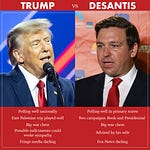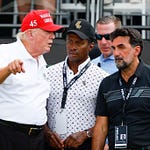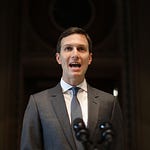The unveiling of the official Emblem of the FIFA World Cup Qatar 2022 in Doha. (Photo by Christopher Pike/Getty Images for Supreme Committee 2022)
Even if you are not an avid football fan, most likely you’ve noticed that, for the first time, the World Cup is being played in the Middle East—specifically in the tiny state of Qatar—and that there have been all sorts of controversies to do with that.
In no particular order:
Gianni Infantino, the President of FIFA, gave a surreal hour-long interview, seemingly to try to defend Qatar’s human rights and LGBTQ rights abuses (criticism has been levied on the death toll of the migrants building the World Cup stadiums) by accusing the West of being hypocritical.
Then there was the whole flip-flopping on buying alcohol in the stadiums.
Then there was extraordinary fact that Saudi Crown Prince MBS—who, in 2017, joined forces with UAE premier MBZ and Egypt and Blockade to blockade their ultra-wealthy rival Qatar—showed up to the World Cup Opening and, grinning, clutched hands with Qatar’s ruler Emir Tamim Al-Thani for photographers.
This despite the fact that, owing to a dispute over the TV rights, Saudis cannot watch the football live—which makes it doubly ironic that Saudi Arabia won a football match against Argentina!
Apparently, the Saudis are so amped up, they are flocking into Qatar to watch the games. And now the Saudi club Al Nassr is trying to buy UK superstar Cristiano Ronaldo.
Noticeably absent from the action in Doha is MBZ, who reportedly wanted the World Cup to happen in the UAE. “He’s not public-facing like MBS, and you never know—depending on who is in the final, he might go for that,” a source told me.
But who did show up regardless of who was winning on the football field? The U.S.’s Middle-East-Beneficiary-in-Chief Jared Kushner and his wife, Ivanka Trump.
Ivanka Trump posted on her Instagram page about her family’s visit to the World Cup in Qatar. [Credit: Instagram]
But what does it all mean for you in your armchair at home?
I spoke to the British academic Matthew Hedges, who specializes in the region. In 2018, Hedges, who is now 35, was pursuing a doctorate in UAE security when he was detained, imprisoned, and tortured in solitary confinement for six months. He was forced to sign a confession document in Arabic, saying he worked for MI6. (He has since said he did not and does not work for British Intelligence and that he only signed the document because he hoped it would secure his release. It did not.) While he was imprisoned, his wife, Daniela Tejada, told the British press that the British Foreign Office dragged its feet and behaved “appallingly” until she drummed up so much attention in the international academic community that Whitehall was forced to swing into action and obtain Hedges's release.
Why the delay? It’s been observed to me that the British government was deal-making with the Emiratis at the time.
It’s Hedges's informed opinion that what we are witnessing this World Cup is the crescendo of political and economic influence that has been so carefully curated and bought in both the U.S. and the UK by the Gulf states. These countries have all shown us recently they are not desert fiefdoms many miles away; they control a great deal more of our lives than most of us know. It’s on the backs of their economies, Hedges says, that we are able to drive, fly, and eat imported food. And, right now, it’s Hedges’s belief that our economic dependence on them means we are openly on our back foot politically, regardless of human rights abuses. A great example was Joe Biden’s visit to the GCC to secure increased oil production, only to be rebutted and publicly shunned by OPEC+'s decision to cut oil production.
So, as you celebrate yesterday’s U.S. victory over Iran on the football field, you need to remember that the Middle East understands its growing global strength as well as the West’s weakness in responding.
You can listen to my conversation with Hedges in the player above or read the transcript, edited and condensed for clarity.
Listen to this episode with a 7-day free trial
Subscribe to Vicky Ward Investigates to listen to this post and get 7 days of free access to the full post archives.















